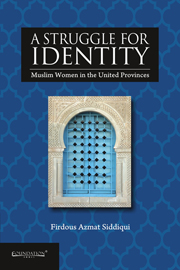Book contents
- Frontmatter
- Contents
- Acknowledgements
- Introduction
- 1 Social Stratification of Muslim Women in the United Provinces
- 2 Socio-religious Movement and the Muslim Women's Issue
- 3 British Perception of Muslim Women: Questions of Fecundity and Health
- 4 Crises in the Social and Economic Identity of Muslim Women: The Great Uprising of 1857
- 5 Changing Profile of Muslim Women through Education
- 6 Patriarchy and Social Obligation of Indian Muslim Women
- 7 Cultural Clash: From Tawaif to Kasbi
- 8 Law, Land and Muslim Women: The Economic Situation
- 9 Muslim Women's Response to the New Judicial System
- Conclusion
- Glossary
- Bibliography
- Index
Conclusion
Published online by Cambridge University Press: 05 October 2014
- Frontmatter
- Contents
- Acknowledgements
- Introduction
- 1 Social Stratification of Muslim Women in the United Provinces
- 2 Socio-religious Movement and the Muslim Women's Issue
- 3 British Perception of Muslim Women: Questions of Fecundity and Health
- 4 Crises in the Social and Economic Identity of Muslim Women: The Great Uprising of 1857
- 5 Changing Profile of Muslim Women through Education
- 6 Patriarchy and Social Obligation of Indian Muslim Women
- 7 Cultural Clash: From Tawaif to Kasbi
- 8 Law, Land and Muslim Women: The Economic Situation
- 9 Muslim Women's Response to the New Judicial System
- Conclusion
- Glossary
- Bibliography
- Index
Summary
This book highlights the real efforts made by both middle-class Muslim women and marginalised women to break out of several Victorian ideas and actions on the part of their menfolk, who sought to re-create the woman as an ideal mother, an ideal daughter, and an ideal wife. These three phases were considered necessary stages in the life-cycle of women, and those women who did not fall within this parameter were considered ‘bad’ or deviant.
This book has also tried to contest the prevalent belief that Indian Muslim women were backward and deprived of all rights as per the Muslim Laws, in both their natal and marital families. During the course of my research, I came to the conclusion that Indian Muslim women were actually determined to progress in the fields of education and literacy achievement, or even in matters concerning the ownership of property, despite being victimised by traditional values and customs, much like their Hindu counterparts. Also, while it is commonly assumed that Indian Muslim women were denied several rights, the fact remains that they did exercise several rights which accrued to them through either their natal or their marital families.
Further, it is erroneous to assume that Indian Muslim women were untouched by the social reform movement in India. From the early stages of the movement, the reformists focused on the condition of women, but only within the paradigm of their patriarchal interests. These reformers might have seemed extremely progressive, especially in matters in which they had a direct interest, for example, on the subject of education. However, this was mostly because they needed educated wives! This was why it was considered necessary for women to be privy to the new education—so that they could become ‘good housewives’. This education in no way encompassed higher education, which was considered appropriate only for men.
- Type
- Chapter
- Information
- A Struggle for IdentityMuslim Women in United Provinces, pp. 219 - 220Publisher: Foundation BooksPrint publication year: 2014



